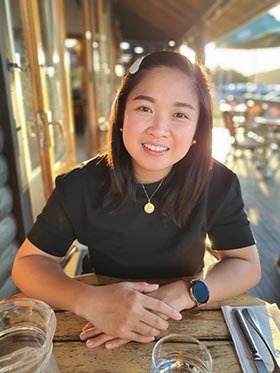 Aloha Sison “fell in love” with aged care nursing in New Zealand, despite rest homes being an unfamiliar concept to the Filipino immigrant.
Aloha Sison “fell in love” with aged care nursing in New Zealand, despite rest homes being an unfamiliar concept to the Filipino immigrant.
“It’s quite a cultural difference. At home, people drop their work to look after their relatives.”
But after emigrating in 2014, and taking a nursing job at a small rest home in Athenree, Bay of Plenty, Sison found she loved it. “I felt really passionate about it and fell in love with gerontology.”
She is now a gerontology clinical nurse specialist at Waikato District Health Board (WDHB), working in partnership with registered nurses in the region’s more than 50 aged residential care (ARC) facilities, particularly those working with high and complex needs residents.
“I provide clinical mentoring and support for ARC nurses and collaborate with them to enhance patient safety and quality of care for our older adult population,” Sison said. “It is also vital that we cultivate a good multidisciplinary team working in the sector.”
‘Not to audit, but to help’
Sison says her role is to grow and enhance the workforce to help older people live well, age well and enjoy respectful care towards the end of their lives. “Not to audit, but to help”, said Sison, who will only get involved if invited.
She had just taken up the role fulltime in January this year, not long before COVID-19 broke out. Hamilton rest home Atawhai Assisi became a cluster, with 15 cases among residents, staff and others linked to the facility.
At Kingswood rest home in Morrinsville, Sison stepped in to help after a dementia unit visitor during the second lockdown tested positive. The home had applied the “bubble” principle, providing accommodation and even buying food so staff didn’t have to go to the supermarket.
While it was a stressful time, nurses “stepped up” amid worries about lack of personal protective equipment (PPE), staffing and stringent new infection, prevention and control measures. She noticed rest-home care often became more person-centred during COVID-19, as staff had to focus on the individual and pick up the roles of families unable to visit.
“We adapted and we thrived through the new norm.”
As an internationally-qualified nurse (IQN), Sison said she had to overcome “many obstacles”. One was the language barrier. “It’s not easy to speak up and you can get shy and intimidated” when English is a second language, she said. “It’s tempting to keep quiet and not risk making a fool out of yourself.”
‘Here, nurses have a voice, each person is respected in their discipline and specialty.’
Compared to her homeland, where medical hierarchies remain entrenched, nurses advocate for their patients in New Zealand. “Here, nurses have a voice, each person is respected in their discipline and specialty.”
The WDHB and Office of the Chief Nurse are supporting Sison to complete her masters and become a nurse practitioner (NP), part of a new joint initiative to grow the number of highly skilled gerontology nurses in the region.
The “pipeline” approach to growing skilled gerontology nurses was part of the WDHB’s strategy for older people He Korowai Oranga o Ngā Kaumātua – a cloak of wellbeing for older people – released this year. It intends to build a resource of NPs across the Waikato who will work closely with older people with high and complex needs, at home or in care, and support other health professionals to do so.
This year, Sison also joined the college of gerontology nursing committee. “I believe in their vision in continuing to raise the profile of gerontology nursing in New Zealand. I am excited to contribute in the future projects of the college to promote optimum outcomes for the older adult population.”



